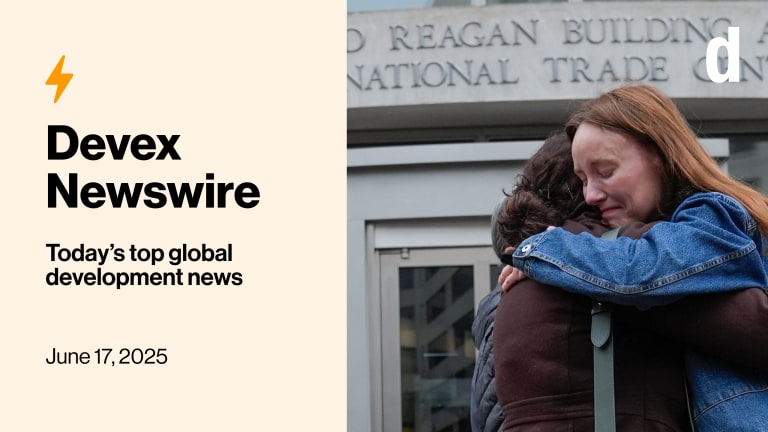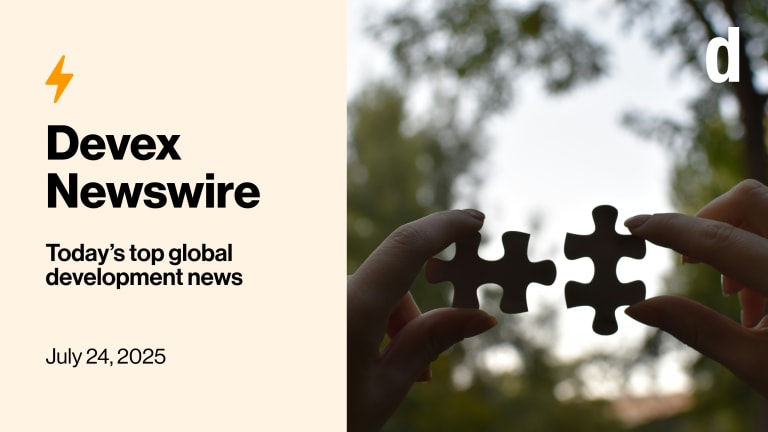
The latest report from the Intergovernmental Panel on Climate Change is out. After concerns over the wording — reportedly from the likes of India, Saudi Arabia, and the United States — the final text is alarming.
The IPCC report finds that:
• Limiting warming to around 1.5 degrees Celsius requires global greenhouse gas emissions to peak before 2025 at the latest, and be reduced by 43% by 2030.
• Without taking into account the economic benefits of reduced adaptation costs or avoided climate impacts, global gross domestic product would be just a few percentage points lower in 2050 if we take the actions necessary to limit warming to 2 degrees Celsius or below, compared to maintaining current policies.
• The right policies, infrastructure, and technology in place to enable changes to our lifestyles and behavior can result in a 40-70% reduction in greenhouse gas emissions by 2050.
This is a preview of Newswire
Sign up to this newsletter for an inside look at the biggest stories in global development, in your inbox daily.
The responses ranged from “terrifying,” according to Christiana Figueres, “ominous,” from Samantha Power, to “distressing but … not surprising,” from Oxfam. Though U.N. Secretary-General António Guterres arguably went farthest: “Some government & business leaders are saying one thing, but doing another,” he tweeted. “They are lying.”
One organization pivoting to work more on climate is the Open Society Foundations, which is traditionally more focused on democracy and human rights. Devex has the first interview with Yamide Dagnet, OSF’s first climate justice director.
She tells my colleague Stephanie Beasley that climate change adaptation and mitigation both require “urgent action” from the philanthropic sector. And Dagnet, originally from Guadeloupe, says that the world should be preparing for the likelihood that people living on islands and in other vulnerable regions will soon be displaced en masse and forced to migrate.
Read: New OSF climate justice head calls for 'urgent' action in global south (Pro)
ICYMI: Last month in Brussels, I touched on this issue with Andrew Harper, special adviser on climate action to the high commissioner for refugees at the UN Refugee Agency — and he told me why UNHCR doesn't like the term “climate refugee.”
+ A Devex Pro subscription brings you essential analysis, data-driven funding insights, and access to the world’s largest global development job board. Get these perks and more by starting your 15-day free trial.
Walkout
Britain’s Foreign, Commonwealth & Development Office’s global LGBTQ conference has been left hanging in the balance after more than 100 British LGBTQ organizations announced Monday they were boycotting the event because trans people were excluded from a government ban on conversion therapy. “If the UK Government cannot stand behind and respect all LGBTQ+ people’s fundamental human rights, it should not be convening an LGBTQ+ rights conference on the global stage,” said a statement from U.K. LGBTQ organization Stonewall.
Something’s missing
U.S. senators reached a deal on a $10 billion COVID-19 aid package Monday, designed to boost domestic testing, vaccination, and treatment efforts. However, they dropped a proposed $5 billion for the global vaccination effort.
Chris Coons, the Democratic chairman of the State and Foreign Operations Subcommittee of the Senate Appropriations Committee, said in a statement that he was “deeply disappointed” by the “short-sighted” agreement. Some House Democrats were unhappy too, though Politico reported that they may have no choice but to pass whatever passes the Senate after a previous deal collapsed in their chamber last month.
Big data
The World Health Organization is set to publish its COVID-19 excess mortality estimates this month, and things are not looking good for India, where the figures are more than four times the official death count of roughly 520,000. An expert involved in the process tells my colleague Amruta Byatnal that the Indian government pushed back on the numbers — which account for both the direct and indirect impact of the pandemic — and even demanded that WHO delay publication by 10 years.
But WHO will go ahead and publish it, a spokesperson says.
“It would be irresponsible to say, let’s wait until the pandemic is over, then we will reflect,” the WHO spokesperson says. “If lessons can be learned now, if lives can be saved now, then we have a responsibility to learn those lessons, and save those lives now.”
The Indian government has a history of refuting researchers’ claims — and has reacted negatively to past studies on excess COVID-19 mortality, calling them speculative and misinformed.
Exclusive: The pushback against WHO's imminent COVID-19 excess deaths estimate
+ Sign up to Devex CheckUp, our free must-read weekly newsletter for exclusive global health news and insider insights, and receive the latest edition Thursday.
DT, go big
Development contractor DT Global has bought two other development firms, roughly tripling its headcount to over 2,000 staff.
Our Business Editor David Ainsworth has the story for Devex Pro subscribers.
Read: DT Global triples size after two acquisitions (Pro)
Fragility first
The Biden administration claimed an “important milestone” in its work on conflict prevention Friday, as it released the first set of priority countries and regions under the 2019 Global Fragility Act at long last. The announcement was due in September 2020, but the former Trump administration missed that deadline, and the Biden administration has been mired in bureaucratic delays.
The countries are Haiti, Libya, Mozambique, and Papua New Guinea, along with the region of coastal West Africa, including Benin, Côte d’Ivoire, Ghana, Guinea, and Togo. Ten-year plans will now be developed for each, with an emphasis on working with like-minded regional, national, and local groups, including civil society.
“We have learned many lessons in the last two decades, and some of them are very hard lessons,” Robert Jenkins, assistant administrator for conflict prevention and stabilization at USAID told reporters. “One of them is, we’re not only wasting time if we think we can impose our plan on a situation and expect to achieve success by force of will, number of boots on the ground, or amounts of dollars spent. We’re wasting time, energy, money, and goodwill to do it alone.”
Read: US announces Global Fragility Act countries and region — finally
Justice pending
On Monday, U.S. President Joe Biden called for a “war crimes trial” amid reports of killings of Ukrainian civilians under Russian occupation — but there is also a reminder of how long justice can take …
The trial of Ali Mohammed Ali Abd–Al-Rahman begins at the International Criminal Court in The Hague Tuesday, almost 20 years after the conflict in Darfur, Sudan. Abd-Al-Rahman faces 31 counts of war crimes and crimes against humanity, with the prosecution alleging he was a senior militia leader between August 2003 and at least April 2004. Human Rights Watch has an explainer.
In other news
Médecins Sans Frontières has released a statement asking governments to reject the leaked text of the WTO’s TRIPS waiver. [MSF]
Cocoa suppliers to major U.K. chocolate manufacturers are using child laborers as young as 10, according to a new investigation. [The Independent]
About 99% of the global population is now breathing polluted air, according to WHO. [UN]
Sign up to Newswire for an inside look at the biggest stories in global development.




